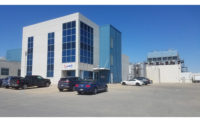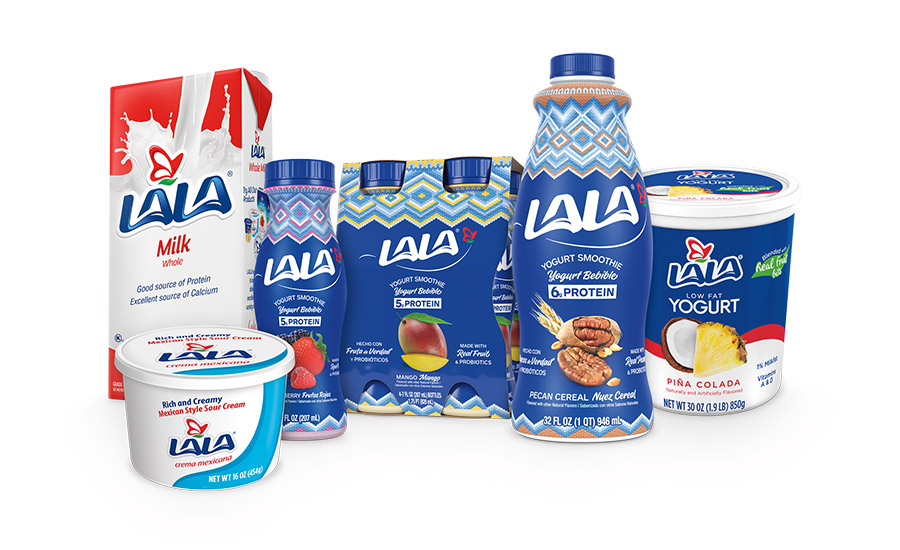LALA U.S. is building on a good thing
With a solid foundation of heritage, authenticity and taste, LALA U.S. has ambitious plans for growth.










The city of Dallas certainly has earned some bragging rights. It is home to the Dallas Cowboys, the most valuable team in the NFL (worth $5.5 billion in 2019, according to Forbes); the Texas State Fair, the biggest state fair in the nation (with more than 2,000,000 visitors annually); and the Dallas Arts District, the largest contiguous urban arts district in the nation.
But the city’s bragging rights aren’t limited to these record-breaking achievements. The Dallas region also proudly serves as a hub of sorts for the food and beverage industry sector. In fact, the Dallas Chamber of Commerce reports that more than 15,000 establishments — ranging from corporate headquarters and production to distribution and retail — account for almost 370,000 jobs locally.
One of those “establishments” is dairy processor LALA U.S. Inc., which is headquartered in Dallas proper. The company is part of Mexico City-based Grupo LALA, a dairy giant — No. 9 on Dairy Foods’ 2019 Dairy 100 listing of the largest dairy processing companies in North America. The sing-songy name actually is an acronym of sorts, making reference to Grupo LALA’s 1949 origin in La Laguna, a region in Northern Mexico.
Despite the long history of its Mexican parent company, LALA U.S. is a relative newcomer. Grupo LALA’s expansion to the United States first took place in 2005 via product distribution. The company later acquired several U.S. manufacturing plants (in 2009 and 2016), notes Jorge Ramos, CEO of the LALA U.S. business unit, which was officially formed in the summer of 2016.
“Our approach is to deliver delicious, healthy products that enrich consumers’ lives,” Ramos says. “We start with a strong brand identity, especially within the Hispanic community, and a reputation for producing fresh, high-quality and authentic products for our customers.”
Differentiated brands
Today, LALA U.S. operates two manufacturing facilities in the United States — in Omaha, Neb., and Colorado Springs, Colo. The Omaha plant produces cultured products (yogurt items and crema, or Mexican-style sour cream), while the Colorado Springs facility processes milk and cottage cheese, Sharon Thompson, vice president supply chain, notes.
These products are produced under four brands: the flagship LALA brand (yogurt, smoothies, crema and milk), Promised Land Dairy (milk), Skim Plus (fat-free milk with more calcium and protein than regular milk) and Nordica (Scandinavian-style cottage cheese). The products — comprising almost 100 SKUs, in total — are sold in a number of channels, Kevin Herbert, chief sales officer, says, including grocery, mass, club, Hispanic specialty, natural, c-store, discount and foodservice.
Although all of the brands bring something unique to the U.S. market, Herbert singles out the LALA and Promised Land Dairy brands as true differentiators for the business division.
“LALA’s yogurt smoothies and crema Mexicana are known for their delicious taste and authentic Mexican heritage,” he points out. “LALA is a strong market leader in Mexico, and the brand’s strength there is a unique differentiator for LALA here in the U.S., especially as consumers seek out and value authentic brands and products.”
In the United States, LALA crema Mexicana has grown well organically without major marketing efforts, he notes. LALA mango yogurt smoothies also have seen impressive growth — and the brand overall is currently the market leader in the adult drinkable yogurt market.
As for the Promised Land Dairy brand, its milk comes from Jersey cows. So the milk products not only have a rich flavor, but also are naturally higher in protein and calcium.
“Our Midnight chocolate milk has an indulgent, rich and creamy flavor and mouthfeel that sets it apart from other chocolate milks,” Ramos cites as an example.
A redefined innovation process
Although LALA U.S. already offers a distinctive product mix, the company is always focused on innovation.
“We are constantly developing and evaluating new concepts and flavors,” Ramos says.
In fact, innovation is so critical to the company that it recently created a new position: head of growth and innovation, he explains.
“This role develops consumer-driven actionable insights, identifies platforms for growth, creates meaningful and disruptive innovation ideas, and improves profitability of our core products,” Ramos says.
The new role comes with a redefined innovation process overall. That process begins with gleaning a deeper understanding of LALA U.S.’s consumers and customers, he notes, to ensure new concepts not only create value, but also fulfill consumer needs.
Once the company defines viable concepts, it engages in a Stage-Gate-type process that leverages the knowledge of subject matter experts from research and development, marketing, sales, supply chain and finance, Ramos says.
“Through this agile and collaborative process, we can quickly bring to life new products that deliver on the needs of our consumers and customers,” he adds.
And innovation isn’t limited to new products and flavors.
“One of our exciting initiatives this year is the rollout of new packaging graphics on our core line of LALA yogurt smoothies,” says Julie Wells, head of marketing. “We feel it really communicates the authentic heritage of the brand in an impactful way.”
Connecting with core customers
When it comes to marketing its products, LALA U.S. understands that “taste is king,” so it puts an emphasis on the outstanding taste of its products, Ramos says.
The company also communicates other positives associated with individual brands and product lines. To market LALA-brand yogurt items, for example, the company touts specific nutritional benefits such as protein content, probiotics and real fruit, he explains. For LALA crema Mexicana, versatility is a key message.
But in connecting the flagship LALA brand with its core consumers — U.S. Hispanics — the biggest positive for the company is authenticity.
“The brand’s authentic Mexican heritage is particularly meaningful as LALA is a connection to Hispanic consumers’ culture and heritage,” Ramos points out.
Re-engaging with core consumers across its other brands is a focus of LALA U.S., too, as it seeks to grow its base business.
“We have a lot of upside in increasing awareness and driving product trial as we expand our consumer reach,” Ramos says. “Consumers are wowed by the delicious taste of our products, so converting trial and purchase is really important. Pursuing new distribution opportunities is also a core component of our strategy.”
Advertising plays a role in building awareness and trial, of course. Here, LALA U.S. relies primarily on digital, social and radio initiatives, he notes.
“We feel digital media, in particular, allows us to efficiently target and reach our consumers and rotate creative and messaging frequently,” Wells says.
On the social media side, LALA U.S. leverages Facebook and Instagram to engage with fans, share product and brand information, and offer inspiration in the form of new recipes and usage occasions, she says.
“We have some passionate fans, and we love interacting with them, reading their comments and hearing how our brands play a role in their lives,” Wells adds. “Our Promised Land Moo Crew are the best milk fans around!”
But the company also likes to interact directly with consumers when it comes to brand-building, Ramos says. For example, it conducted tailgating events earlier this year to showcase its LALA crema Mexicana in select markets. And it conducted samplings of its Promised Land Midnight chocolate milk.
“The great taste of our products makes these in-person events quite successful for us,” Ramos maintains.
Positioned for growth
Looking down the road, LALA U.S. has some lofty goals. The company aims to at least double in size within the next five years, Ramos says. To accomplish that, LALA U.S. will need to expand its distribution footprint to additional regions, continue to innovate and even move into new product categories.
Also critical to LALA U.S.’s continued growth, he notes, will be positioning LALA as the No. 1 Hispanic yogurt brand, strengthening the positioning of Promised Land Dairy chocolate milk as “the best chocolate milk,” enhancing its brands’ in-store execution and presence, and optimizing its supply chain.
The company certainly seems up to the task. Its executive team has more than 100 collective years of management experience within the consumer-packaged-goods industry — with team members boasting diverse experience at companies that include PepsiCo, Unilever, Procter & Gamble, Coca-Cola, Borden and Starbucks, both inside and outside the United States.
“At LALA, we believe that our main strength comes from diversity, different experiences, different backgrounds, different contexts and ways of thinking that enables us as an organization to make sustainable decisions,” Ramos offers.
The company’s core values, which essentially sum up its management philosophy, also should help guide the way to growth.
“We are people; we think like owners; we don’t take shortcuts; we are authentic; we dream big; we are practical; we grow by meritocracy; we deliver results; and we lead by example,” Aaron Armas, vice president, human resources, cites.
But the quest for growth won’t compromise LALA U.S.’s focus on its people, customers and communities.
“LALA is always striving to positively impact the communities where we operate,” Ramos stresses. “For example, our employees are active in volunteering and supporting local food banks and community gardens, with the company’s support. The COVID-19 pandemic has focused attention on the importance of local food banks.”
Environmental sustainability also is a key part of LALA U.S.’s culture, he adds. The company strives to reduce waste during processing and make its packaging recyclable.
Going forward, all of the initiatives tied to growth goals also stand to benefit from the very strong base on which LALA U.S. already stands.
“In the U.S., LALA is building on the strong legacy of our parent company, which is synonymous with dairy foods below the border,” Ramos stresses. “We are a highly recognized brand among the Hispanic community in the U.S. We offer products that differentiate us from the competition, based on heritage, authenticity and taste.
“This is a solid foundation from which to grow,” he adds. “We are excited about the future.”
Looking for a reprint of this article?
From high-res PDFs to custom plaques, order your copy today!






.jpg?height=200&t=1629827716&width=200)




